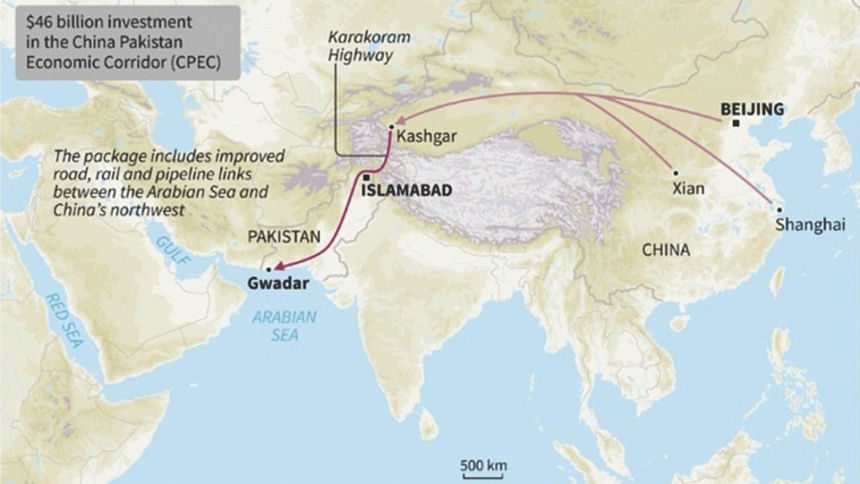Who needs Chinese investment?

No country can match Chinese appetite for FDI. While the PM Modi's visit to Bangladesh has aroused much interest and a number of agreements have been signed on energy and other areas to the tune of some US$2billion+, China has just signed 51 Memorandums of Understanding (MoUs) and agreements with Pakistan to the tune of $45 billion. It covers everything from energy to key elements of infrastructure development – roads, highways, port facilities.
In line with the "One Road One Belt" initiative, financing has been finalised for some serious power generation deals for energy-starved Pakistan. These include a 1,000 megawatts (MW) Solar Power Park, two hydropower projects generating 1,590MW, and three wind power projects that will add 200MW. Concessional loans will finance the upgrading of a number of key highways and a deep sea port at Gwadar. From what has been published in Pakistani media, China is going to pour in about $28 billion to start off projects immediately while the remaining $17 billion will be in the pipeline subject to further studies and assessments.
Pakistan has been suffering from a serious energy crunch the last few years. Some parts of the country experience power load-shedding up to 12 hours a day. It is no wonder that Chinese investments are going into coal-fired power plants. MoUs have been signed to build 2x660MW coal-fired power plant at Port Qasim. Another power project will bring 2x330MW of power from coal. With about $34 billion to be invested in energy projects and the rest $11 billion in roads, a railway and other transport infrastructure including the Gwadar port. Should the bulk of these investments become reality Pakistan's economy will receive a boost of unimaginable proportions.
Indeed, Chinese largesse has the potential to transform Pakistan into a regional hub for trade and investment. Boasting infrastructure, the quality of which is seen in other ASEAN countries, will go a long way in reversing the country's fortunes, which, like Bangladesh, has been held back for years by a dilapidated infrastructure base. The economic corridor being built by China through Pakistan to reach the warm waters of the Arabian Sea will enable China to dramatically reduce transportation time and costs. For Pakistan, the benefits are obvious as stated by PM Nawaz Sharif during Chinese President's visit to that country recently: "This corridor will benefit all provinces and areas in Pakistan, and transform our country into a regional hub and pivot for commerce and investment. It will also enable China to create a shorter and cheaper route for trade and investment in south, central and west Asia, the Middle East and Africa."
For years, Bangladesh has struggled with how best to get mega projects off the ground. We have been sitting on several projects which are crucial for connectivity and development. Some have languished for years; most notably, the Padma Bridge, metro rail, the Dhaka Elevated Expressway, and expansion of the railway network are some glaring examples. China has been looking to collaborate with Bangladesh on a deep-sea port in the Bay of Bengal. What is interesting to note is that China has been open to the idea of a multinational participation in developing the port including India. Yet we have dillydallied on the issue for years.
Today, China is moving ahead with a deep sea port off Pakistan. It is helping to transform that country's entire economic backbone with collaboration on power, road-rail-water links, port facilities and cooperation on defence. A fraction of the Chinese investments being made in Pakistan could help our economy transform in the right direction. What stops us from attracting these multibillion dollar investments that can free the country from power outages, help move goods freely across the country and beyond, provide our industry room for growth and boost exports?
We will need help in exploring our offshore resources, particularly oil and gas exploration. The country possesses neither the finance nor the technical expertise to expand into this uncharted territory. We require both technical cooperation and multibillion dollar investments to fully exploit our offshore resources. One must not forget that Bangladesh has two strategic partners in the region, India and China. Our strategic location in the overall geopolitical scenario provides the perfect setting for both India and China to collaborate on trade and commerce. India for its part has been courting and getting Chinese investments. While we move ahead to form a regional trading that includes other SAARC countries, we should not turn a blind eye to Chinese involvement in future economic development of the country. The $45 billion package China is embarking on with Pakistan should serve as an eye-opener for Bangladeshi policymakers. A balanced FDI outlook towards the two major regional superpowers can only work to our benefit.
The writer is Assistant Editor, The Daily Star.

 For all latest news, follow The Daily Star's Google News channel.
For all latest news, follow The Daily Star's Google News channel. 



Comments